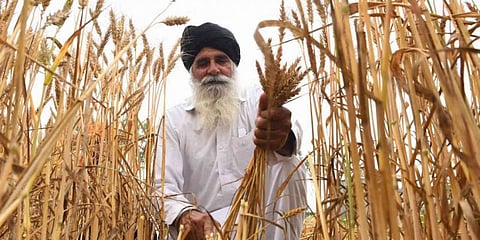The Right to Information (RTI) has revealed that Punjab has emerged as the biggest beneficiary in the Central government's procurement of wheat and paddy. This comes as no surprise, as Punjab is known as the breadbasket of India and contributes significantly to the country's food security.
The Minimum Support Price (MSP) for wheat and paddy has been increased every year since 2014, which has led to a substantial increase in the income of farmers in Punjab. The MSP is the price at which the government procures crops from farmers, and it acts as a safety net for farmers in case of a price crash in the market.
As per the reports of OpIndia ,In FY 2018-19, 126.92 LMT wheat was procured, and Rs 22020.62 crores (MSP @ Rs 1,735 per quintal) were paid. In FY 2019-20, 129.12 LMT wheat was procured, and Rs 23,758.08 crores (MSP @ Rs 1,840 per quintal) were paid. In FY 2020-21, 127.14 LMT wheat was procured, and Rs 24,474.45 crores (MSP @ Rs 1,925 per quintal) were paid. In FY 2021-22, 132.22 LMT wheat was procured, and Rs 26,113.45 crores (MSP @ Rs 1,975 per quintal) were paid. In FY 2022-23, 96 LMT wheat was procured, and Rs 19,434.69 crores (MSP @ Rs 2,015 per quintal) were paid. Only FY 2015-16 and FY 2020-21 saw a slight drop in procurement. MSP was increased every year without fail.
The increase in MSP has provided a boost to the agricultural sector in Punjab, and it has also led to an increase in the procurement of wheat and paddy by the Central government. The RTI data reveals that Punjab has procured 63% of the total wheat and paddy procured by the Central government in the last five years. This translates to around 230 million tones of wheat and paddy, which is a staggering amount.
The increase in procurement has also had a positive impact on the state's economy, as it has led to an increase in demand for labour and transportation services. The state government has also benefited from the increase in procurement, as it has resulted in an increase in revenue through taxes.
In conclusion, the increase in MSP for wheat and paddy has benefited the agricultural sector and the state's economy in Punjab. However, there is a need to address the concerns related to monoculture-based agriculture practices and promote sustainable agriculture practices. The state government should take proactive steps to promote crop diversification and alternative crops to ensure long-term sustainability in the agricultural sector.


